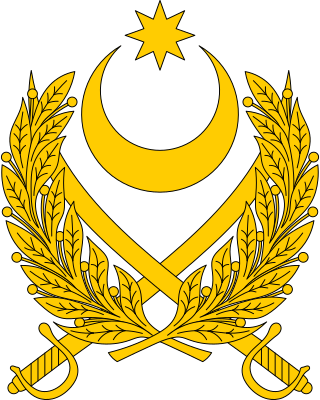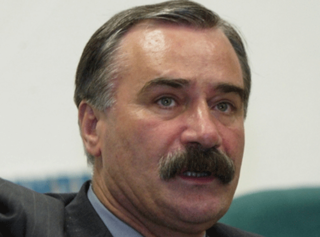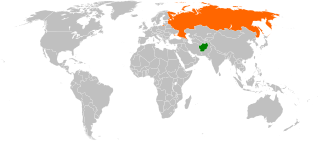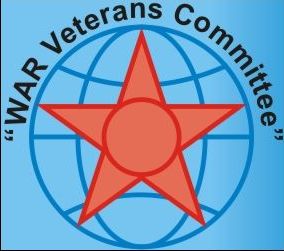
The Azerbaijani Armed Forces were re-established according to the Law of the Republic of Azerbaijan on the Armed Forces from 9 October 1991. The Azerbaijan Democratic Republic (ADR) had originally formed its own armed forces from 26 June 1918 but were dissolved after Azerbaijan was absorbed into the Soviet Union as the Azerbaijan Soviet Socialist Republic from 28 April 1920. After the Soviet Union dissolved in 1991–92, the armed forces were reformed based on Soviet bases and equipment left on Azerbaijani soil.

Foreign relations of Kazakhstan are primarily based on economic and political security. The Nazarbayev administration has tried to balance relations with Russia and the United States by sending petroleum and natural gas to its northern neighbor at artificially low prices while assisting the U.S. in the War on Terror. Kazakhstan is a member of the United Nations, Collective Security Treaty Organization, Organization for Security and Co-operation in Europe, North Atlantic Cooperation Council, Commonwealth of Independent States, the Shanghai Cooperation Organisation, and NATO's Partnership for Peace program. Kazakhstan established a customs union with Russia and Belarus, transformed into the Eurasian Economical Community then in 2015 into the Eurasian Economic Union. President Nazarbayev has prioritized economic diplomacy into Kazakhstan's foreign policy.

The First Chechen War, also known as the First Chechen Campaign, or the First Russian-Chechen war, was a war of independence which the Chechen Republic of Ichkeria waged against the Russian Federation from December 1994 to August 1996. The first war was preceded by the Russian Intervention in Ichkeria, in which Russia tried covertly to overthrow the Ichkerian government. After the initial campaign of 1994–1995, culminating in the devastating Battle of Grozny, Russian federal forces attempted to seize control of the mountainous area of Chechnya, but they faced heavy resistance from Chechen guerrillas and raids on the flatlands. Despite Russia's overwhelming advantages in firepower, manpower, weaponry, artillery, combat vehicles, airstrikes and air support, the resulting widespread demoralization of federal forces and the almost universal opposition to the conflict by the Russian public led Boris Yeltsin's government to declare a ceasefire with the Chechens in 1996, and finally, it signed a peace treaty in 1997.

Desertion is the abandonment of a military duty or post without permission and is done with the intention of not returning. This contrasts with unauthorized absence (UA) or absence without leave, which are temporary forms of absence.

Missing in action (MIA) is a casualty classification assigned to combatants, military chaplains, combat medics, and prisoners of war who are reported missing during wartime or ceasefire. They may have been killed, wounded, captured, executed, or deserted. If deceased, neither their remains nor grave have been positively identified. Becoming MIA has been an occupational risk for as long as there has been warfare.

Ruslan Sultanovich Aushev is a former politician. He was the president of Ingushetia from March 1993 to December 2001. He was reportedly the youngest officer in the Soviet army to reach the rank of lieutenant general. He was awarded the title Hero of the Soviet Union on 7 May 1982 for his actions in Afghanistan. Aushev has emerged as Ingushetia's most popular politician, having kept peace and stability during the First Chechen War.

The American Expeditionary Force, North Russia was a contingent of about 5,000 United States Army troops that landed in Arkhangelsk, Russia as part of the Allied intervention in the Russian Civil War. It fought the Red Army in the surrounding region during the period of September 1918 through to July 1919.
The Soviet–Afghan War had an important impact in popular culture in the West, due to its scope, and the great number of countries involved. The Russian-Ukrainian film The 9th Company, for example, became a blockbuster in the former USSR earning millions of dollars and also representing a new trend in Russia in which some domestic films are "drawing Russian audiences away from Hollywood staples." The use of the war in Russian cinema has attracted scholarly attention as well. Some of this attention focuses on comparisons of the conflict with other modern wars in Vietnam and Iraq. Other work focuses on the war and fictional accounts of it in the context of Soviet military culture. Even when not directly portrayed, service in the war is sometimes used as a backstory for Russian characters to explain their combat prowess, such as in the manga and anime series Black Lagoon.

The Bronze Night, also known as the April Unrest and April Events, refers to the riots in Estonia surrounding the controversial 2007 relocation of the Bronze Soldier of Tallinn, a Soviet World War II memorial in Tallinn.
The Badaber uprising was an armed rebellion by Soviet and Afghan prisoners of war who were being held at the Badaber fortress near Peshawar, Pakistan. The prisoners fought the Afghan Mujahideen of the Jamiat-e Islami party in an unsuccessful attempt to escape. All the prisoners were killed in the ensuing siege and the fortress was destroyed.

Relations between Afghanistan and Russia first emerged in the 19th century. At the time they were placed in the context of "The Great Game", Russian–British confrontations over Afghanistan from 1840 to 1907. The Soviet Union was the first country to establish diplomatic relations with Afghanistan following the Third Anglo-Afghan War in 1919. On 28 February 1921, Afghanistan and Soviet Russia signed a Friendship Treaty. The Soviet Union intervened in Afghanistan against the Basmachi movement in 1929 and 1930.

The War Veterans Committee, or simply WVC is a public international association of social veterans' organizations since 1992. War Veterans Committee unites about 40 veterans' organizations of CIS states. The Head of WVC is Ruslan Aushev. On 23 July 2004, the War Veterans Committee was granted a special consultative status by the United Nations Economic and Social Council.
The Centre for Analysis of Strategies and Technologies (CAST) (Russian: Центр анализа стратегий и технологий) is an independent, for-profit Russian think tank located in downtown Moscow.
PAF Camp Badaber, formerly known as Peshawar Air Station, is a non-flying air force base of the Pakistan Air Force and a former United States Air Force–Central Intelligence Agency listening post, used by the 6937th Communications Group from July 17, 1959 until being evacuated on 7 January 1970, when the facility was formally closed. It was located in Badaber, a remote area about 4 miles (6.4 km) south of the city of Peshawar, Pakistan.
Badaber, alternatively spelt Badhber is a village in Peshawar District, Khyber Pakhtunkhwa, Pakistan. It is located approximately 10 km (6.2 mi) south of the city of Peshawar.
Vitaly Stepanovich Smirnov was a Soviet diplomat. He served as the Soviet ambassador to Pakistan during the 1980s. His tenure was characterised by several notable events in Pakistan–USSR relations, including the Soviet–Afghan War and the Badaber Uprising in Peshawar in 1985. Earlier, he was the Permanent Representative of Belarus to the United Nations (1967–1974).

The Fortress in Badaber is a Russian TV series about the events that occurred during the Afghan War. In the center of the plot is an uprising in the camp of Badaber. The uprising in Badaber camp was an episode of the Afghan war, during which on April 26, 1985 an unequal battle took place between the detachments of Afghan Mujahideen and the units of the regular Pakistani Army supporting them, on the one hand, and a group of Soviet and Afghan prisoners of war, on the other. The attempt of prisoners of war to free themselves from the camp failed. As a result of the two-day storming of the Badaber camp with the use artillery, the majority of prisoners of war were killed. The film, however, was created to show the union of Russians, and to show what the Russian hostages of the camp in Badaber went through.
Siyavush Dunyamali oghlu Novruzov is a Member of the National Assembly of Azerbaijan is the second, third, fourth, fifth and sixth convocation Member of the Milli Mejlis of the Republic of Azerbaijan, chairman of the Committee on Regional Affairs of the Milli Mejlis, Deputy Executive Secretary of the New Azerbaijan Party (YAP), DPhil in Law.
Large-scale organized protests by students in the city of Kabul, Afghanistan, paralyzed the education system and led to heavy clashes. The uprisings by students took place from late April to early June, 1980, demonstrating against the communist government of Babrak Karmal and the invading Soviet Union forces, calling for freedom and the withdrawal of Soviet forces. The protests were quelled and led to a large number of students being arrested, estimated between 400 and as many as 2000. Between 72 and 200 students lost their lives in the demonstrations.

The Non-Aligned Movement (NAM) is a forum of 120 countries that are not formally aligned with or against any major power bloc. After the United Nations, it is the largest grouping of states worldwide.












